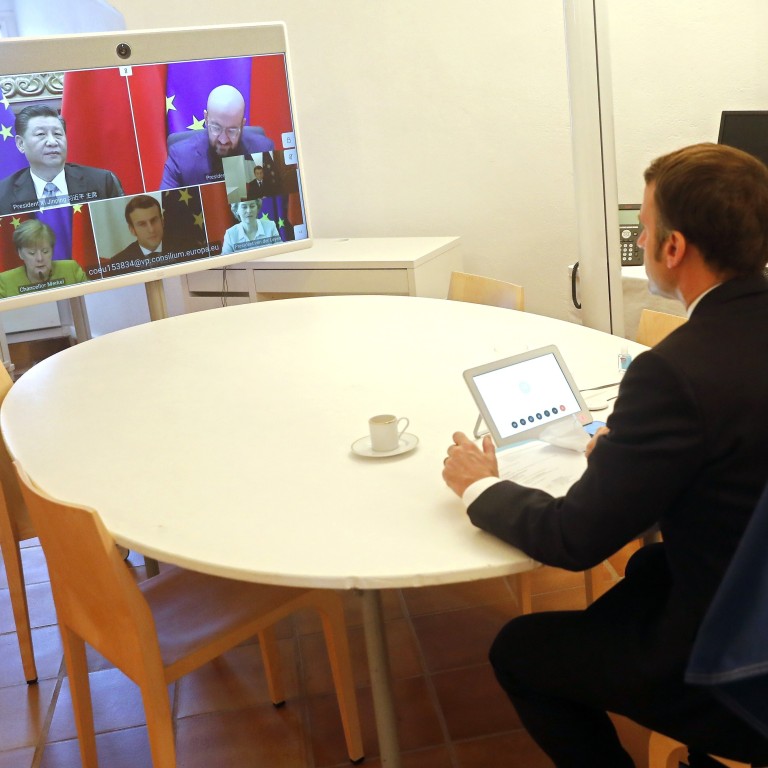
China-EU investment deal: ‘landmark’ treaty greeted with a shrug by underwhelmed analysts
- Some analysts say Brussels has oversold deal with China, which was seven years in the making but has been met with scepticism
- China also retains control in key sectors, with economists suggesting Europe’s struggling economy weakened its negotiating position
The China-EU investment deal agreed to in principle on Wednesday has been greeted with a shrug by economists, with some questioning whether an under-pressure European Commission has oversold a deal that will not significantly move the needle in economic terms.
The deal retains multiple deep carve-outs to protect Chinese interests in key sectors, including automotive, aviation, health care and telecoms, according to an early negotiating text, and contains some commitments that Beijing has made in previous agreements and in its own existing policies, analysts said.
The suggestion from some quarters is that, with the European economy brought to its knees due to the ongoing coronavirus pandemic, and the United States in a state of flux as it awaits the inauguration of president-elect Joe Biden on January 20, Beijing saw the chance to capitalise, swooping in to seal a deal that can be billed as a big political win for President Xi Jinping.
Europe is already open to Chinese investment, and China’s pledged liberalisations are pretty shallow
“The European economy is going to be in much worse shape than the Chinese one,” said Alicia Garcia- Herrero, chief economist for the Asia-Pacific region at investment firm Natixis. “There is a sense in Europe that China is only going to get so much bigger, so that’s the idea behind this – ‘Let’s get whatever we can get’ – and that’s ultimately the reason they signed this.”
The deal will reduce barriers to entry for many European businesses, but Chinese carve-outs for important industries such as electric vehicles – held up by the commission as one of the major sectors to benefit from the arduous negotiations – have been met with scepticism.
“The agreement still allows both sides to maintain a pretty big degree of discretion in terms of final decision-making on investments. So, if you have exceptions around public morals or national security or other nation-specific protocols, it kind of defeats the purpose of having an investment agreement in the first place,” said Nick Marro, global trade lead analyst at the Economist Intelligence Unit.
“Europe is already open to Chinese investment, and China’s pledged liberalisations are pretty shallow. We might see some big deals, but probably not much that could immediately lift gross domestic product numbers,” he added.
“Why do you oversell something that it seems people are getting already, that in your case is limited by the treaty? It says you can only set up if you’re a new investor, but what kind of investor? Are we going to create a new auto company that is not present in China that can build electric cars,” Garcia Herrera asked, arguing that the pressure on the European economy had backed policymakers into a corner.
Questions will also be raised as to whether a commitment for China to publish an annual account of subsidies doled out to service sector firms is enforceable, since it is not subject to the state-to-state dispute-settlement clause of the draft deal, the draft text shows. And the deal does not contain a mechanism for monitoring Chinese industrial or manufacturing subsidies.
The draft suggests that there is no investor-state dispute-settlement clause – a controversial mechanism whereby companies can sue governments for perceived damage to their investments – but a negotiating note says that the pair will continue to negotiate on investment protection “independently from the outcome reached in the liberalisation part of the agreement”.
European businesses welcomed the deal, with Joerg Wuttke, president of the EU Chamber of Commerce in China, saying that “a strong agreement would be a powerful statement to show that constructive engagement can produce results”.
“If winter comes, can spring be far behind? The conclusion of the China-EU investment agreement, the UK-EU free-trade agreement, and the [Regional Comprehensive Economic Partnership] have brought three warm winds to the global economy hit by the epidemic, and also swept away the hostility of the Trump era,” Wang wrote.
The Chinese Ministry of Commerce said in a statement that “the scope of the agreement goes far beyond traditional bilateral investment agreements”, adding that “the results of the negotiations cover four aspects: market-access commitments, fair competition rules, sustainable development and dispute settlements”.
The European Commission said China has committed to “effectively implement International Labour Organization (ILO) Conventions it has ratified”, and to “work towards the ratification of the ILO fundamental Conventions, including on forced labour”.
But critics said it had not gone far enough.
“[The European Parliament] should insist on ratification of ILO conventions. (CCP can do everything, why not do this then, if they really want it?) Plus Human Rights Sanctions Mechanism. Plus banning imports of products of forced labour,” Reinhard Butikofer, chairman of European Parliament’s Delegation for Relations with China, wrote on Twitter.

